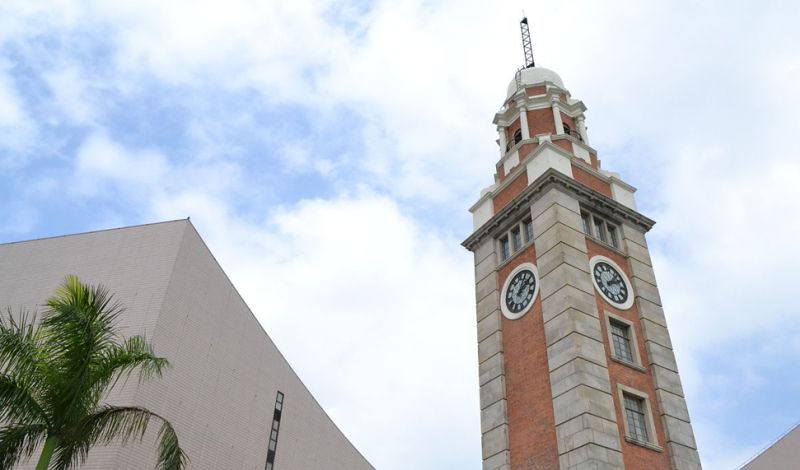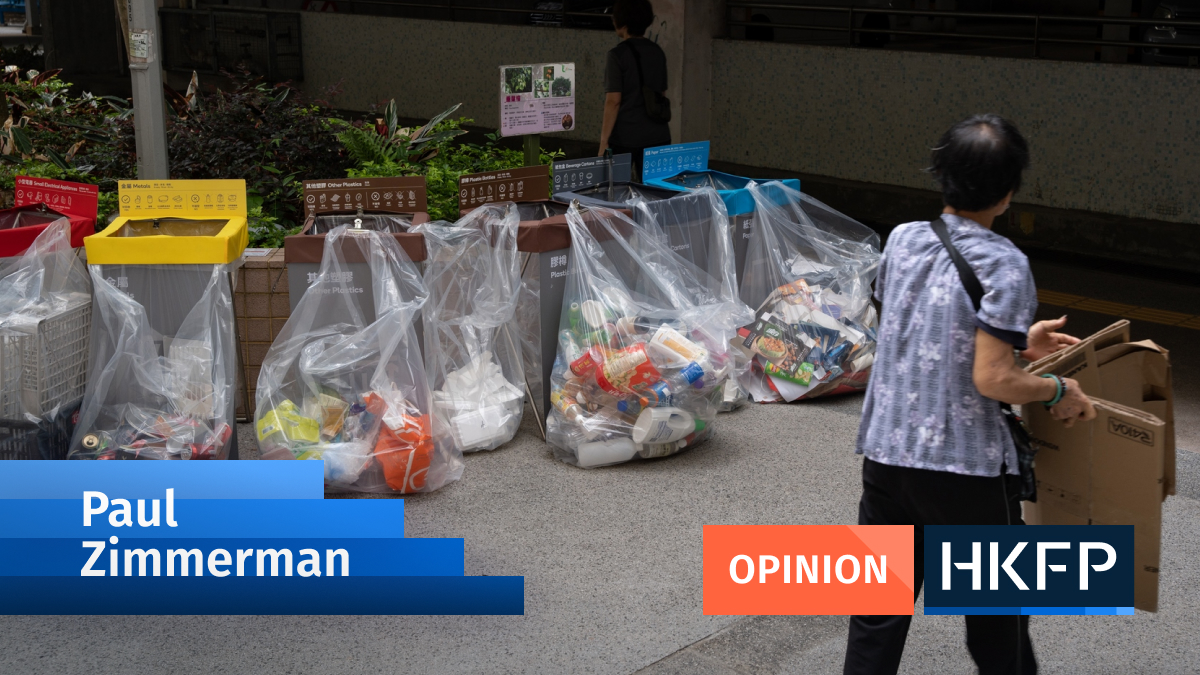I came across an unusual spectacle in the Tsim Sha Tsui metro station: a little group of policemen were handing out small packets to passers-by.
This was intriguing. So I passed by and was in my turn awarded a small packet, which turned out to be a wallet-like item in blue plastic. The policeman who gave it to me misunderstood my puzzled look completely.

“I’m a policeman,” he said. “Yes, I know,” I replied. And went on my way home. On closer examination the wallet-like object turned out to contain two tissues. It was printed with messages in two languages urging citizens to join the fight against crime.
In English this message was rather generic and included a couple of phone numbers for reporting your suspicions. I am told the Chinese part was rather more specific about the risk of having your pocket picked, which I imagine is quite high in Tsim Sha Tsui.
I will leave to more fanatically environmental pens the question of whether distributing pieces of plastic is a planet-friendly way to fight crime. I thought I might find a use for the little wallet and the two tissues will come in handy.
As I wandered on I felt a wave of nostalgia. When I was a kid it was considered acceptable, and indeed healthy, for mothers to shoo their children out of the house on sunny days to play in the fresh air with their mates in the neighbourhood.
I do not remember any serious harm resulting from this practice but people are more timid about children in public places these days. Anyway there was one problem, which was how your offspring would know when it was time to come home.
In those days watches were far too expensive and fragile to be entrusted to children, at least in my family’s income bracket. Outside town centres there were few public clocks. One useful indicator was the “lighting up time.”

In those days the street lights did not have the light-sensitive switches which turn them on in the middle of the day if it gets too gloomy. They were on a timing arrangement; the time to switch them on was fixed in advance and they all came on together.
Because in European latitudes the length of the day varies considerably through the year the timing of the lighting up also varied and the current week’s time was published in the newspapers. When the street lights came on you went home.
The trouble with this was that in the summer the lighting up actually came quite late. The other recourse which we were recommended was to ask a stranger politely for the time.
Actually in those days many strangers did not have a watch either, but there was one group for whom it was a professional requirement: policemen (policewomen were rare at the time). Policemen also had the advantage of being respectable and generally helpful. Parents thought it useful for their kids to be accustomed to friendly encounters with The Law.
So we were frequently reminded – and the catch phrase became so common it was eventually turned into a song – that “if you want to know the time, ask a policeman.”
Your policeman in those days had a distinctive dark blue uniform, topped with a historic helmet: think of the Rorkes Drift movie Zulu but in dark blue. Paramilitary policing had not been invented either so when you were old enough to go to demonstrations and public protests you encountered the same uniform, for which many of us had learned an instinctive respect.

Well, times back in the UK have changed. All kids have mobile phones these days. The police helmet has gradually disappeared because it is awkward for an increasingly car-borne force. And some people have developed a pretty prickly relationship with the forces of order.
This was a slow process. Hong Kong’s claim to historical fame is the rapidity with which our cops managed in just over a year to pass from somewhere close to “If you want to know the time, ask a policeman” to “If you don’t eat your spinach I will call a policeman who will take you away to be tortured at a black site in the New Territories”.
And the Force is still, it seems, picking unnecessary fights. The fuss about who is a reporter is hopelessly old-fashioned. In this age when everyone effectively has a small camera in his pocket, anyone can be a reporter. This is a fact of life.
No doubt it is very offensive to the constabulary’s feelings that a shopping mall should be filled with a handful of protesters and 250 “reporters” filming them. But if there were only a handful of protesters perhaps the best solution would have been to reduce the number of policemen.
Let us give some thought to curbing over-violent policing methods. Clearly the complaints mechanism is going to be no help here. Could there be some subtle change which would encourage a less macho approach without offending the law and order industry?

It is well established that people are surprisingly responsive to small cues in their environment. So it would help if we did something about those uniforms. Do riot squads have to be in black? I realise the young men wearing the gear probably do not make the visual connection to Hitler’s SS, but black is the colour of piracy, Death’s Head Hussars, Darth Vadar’s cloak, the bad guy’s hat in the Old Westerns…
Surely the dark blue gear for the Special Tactical Squad would be just as good at protecting the wearer and much less likely to put unhelpful ideas into his head if it was all pink. This might require a name change but I was never happy with “Raptors”. We do not need a predatory police force. They would be much nicer as Pink Panthers.
Alternatively we could take the new tolerance of unauthorised badges to its logical conclusion and sell the space on the riot gear for advertising. Police officers would then be like Formula One racing cars, in which the underlying colour is barely visible under all the salesmanship.
Alas, this presupposes that the Force wishes to be loved rather than feared, which on present form seems unlikely. The management seems quite happy to be the dogs in our local Animal Farm, loyally supporting the ruling pigs.
They should remember that in that famous closing scene, when the pigs are entertaining humans in the old farm house and the other animals can no longer tell the two groups apart… the dogs are left outside.
Support HKFP | Policies & Ethics | Error/typo? | Contact Us | Newsletter | Transparency & Annual Report | Apps
Help safeguard press freedom & keep HKFP free for all readers by supporting our team
| HKFP is an impartial platform & does not necessarily share the views of opinion writers or advertisers. HKFP presents a diversity of views & regularly invites figures across the political spectrum to write for us. Press freedom is guaranteed under the Basic Law, security law, Bill of Rights and Chinese constitution. Opinion pieces aim to point out errors or defects in the government, law or policies, or aim to suggest ideas or alterations via legal means without an intention of hatred, discontent or hostility against the authorities or other communities. |

More HKFP OPINION:
HKFP has an impartial stance, transparent funding, and balanced coverage guided by an Ethics Code and Corrections Policy.
Support press freedom & help us surpass 1,000 monthly Patrons: 100% independent, governed by an ethics code & not-for-profit.










